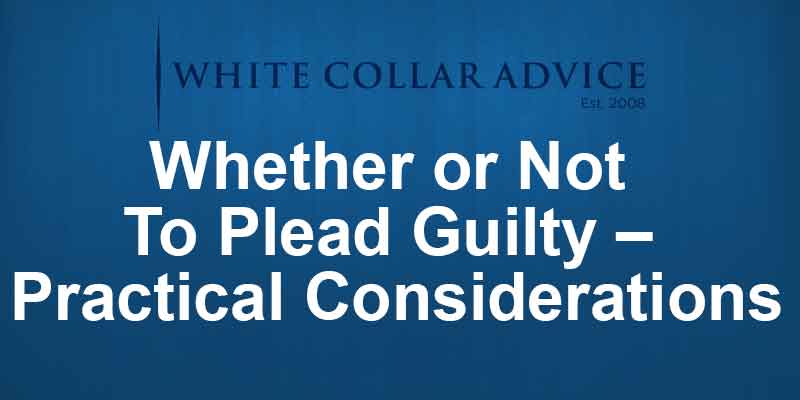You have been charged with a white collar crime, and are facing a potentially lengthy prison sentence if convicted, significant legal fees to defend yourself, and the prospect of a trial where your “dirty laundry,” in terms of the charges against you, will be aired in public. Then you receive a plea offer from the prosecutors in which the Government agrees to drop some of the charges against you in exchange for a guilty plea. What should you take into consideration when deciding whether or not to accept the plea offer (recognizing that no two cases are exactly alike)?
Reasons to Consider Not Accepting a Plea Offer:
You’re innocent, and the prosecutors have it all wrong. You want to be exonerated at trial. If you go to a trial, you may be found not guilty. If the prosecutors have a weak case, it may fall apart during trial. And any guilty verdict must be unanimous, often not an easy task. Also remember that there are many adverse consequences to being a convicted felon. You’re a felon for life. It is much more difficult to get a job, as most job applications ask whether you’ve been convicted of a felony. You can’t vote. You will likely be placed on probation for up to 3 years, have to report to a Probation Officer, and have a number of restrictions placed on you.
Reasons to Consider Accepting a Plea Offer:
First and foremost, you will almost certainly be able to plead guilty to lesser charges if you accept a plea offer, and will therefore ultimately receive a lesser sentence than you would have received if you had gone to trial and were found guilty. If you are able to cooperate, your sentence may be reduced even further. In fact, you may not receive any jail or federal prison time at all, although that, of course, will depend entirely on the facts and circumstances of your particular case. Your fines and penalties may also be reduced considerably.
In a federal case, where the courts are required to consider the Federal Sentencing Guidelines, if you plead guilty you will receive credit because both the Government and the courts will be able to conserve their resources. Moreover, significant cooperation could earn you a 5K letter from the Government, in which the Government asks the court to sentence you to a term of imprisonment below the Guidelines range, possibly significantly below the range.
Finally, of course, to plead guilty you must be guilty. At your plea hearing, the court will ask the necessary questions to ensure that your guilty plea is both voluntary and intelligent, that you actually committed the crime, and that you recognize that you are waiving your Constitutional rights to a jury trial, to confront the witnesses against you, and to remain silent without the prosecutor being able to comment on your failure to testify.
Take Aways:
The vast majority of criminal cases do not go to trial, but rather, are resolved by plea agreements and guilty pleas. In deciding whether or not to accept a guilty plea, a defendant must carefully balance the pros and cons of a plea.
- Am I guilty?
- What are the chances of success at trial, that is, a not guilty verdict on all courts?
- How much risk am I willing to take?
- What will it cost me to try the case?
- How will the publicity of a case, if any, affect both myself and my family?
It is only after carefully considering questions such as these that a defendant can make an informed decision on whether or not to plead guilty. And remember, once you plead, be prepared to live with the consequences, as it is usually very difficult to set aside your plea.
Finally, hiring the right criminal defense lawyer is also very important. Hire an experienced white collar criminal defense attorney who you are comfortable with, and who can help guide you through the process as you consider the difficult decision of whether to plead guilty or not. If you have questions about the legal process, feel free to reach out.
David Rosenfield
(212) 592-1513
CNN Exclusive: Justin Paperny Analyzes Sam Bankman-Fried’s 25-Year Sentence
https://youtu.be/KgP_9aRrEZs I was saddened to hear Sam Bankman-Fried say his useful life is over. Many individuals facing prison share that sentiment, and I certainly did during my own experience. Navigating through such challenging times requires learning from those...
Breaking Down Sam Bankman-Fried’s Upcoming Sentencing
https://youtube.com/live/WC59hWkUUE8 Join me in this live session as I cover the upcoming sentencing hearing of Sam Bankman-Fried, scheduled for tomorrow before Judge Kaplan. As many of you are aware, the government is pushing for a hefty term of up to 50 years in...
Get Out Of Federal Prison Early!
If you are going to federal prison, we know you want out as quickly as possible. But how? https://youtube.com/live/2jTG3MexFog It starts with understanding stakeholders, including case managers. Case managers are key figures within this system, maintaining lists...
What’s Next for Peter Navarro at Miami Federal Prison Camp?
Following a CNN interview about Peter Navarro, I got many nasty Instagram messages and a phone call from someone claiming to be close to his family. Essentially, he called to reprimand me or give me the "411," as he said. To be clear, I don't think Peter Navarro...
White Collar Advice: Your Guide Through the Sentencing Journey
Hi Alec Burlakoff here, with White Collar Advice. I am writing to share insights on the sentencing journey. This morning, I had a talk with someone who felt like he was navigating through a storm without a compass when it came to sentencing and mitigation. It struck...
The Most DANGEROUS Thing In A Federal Prison Camp
https://youtube.com/shorts/KlWP-3VOVvo Federal Prison Camp My first day in federal prison included the basics: ProcessingObserving the layout of the campEating in the chow hallStanding for count You know the basics! Yet, it was during a seemingly mundane walk around...

